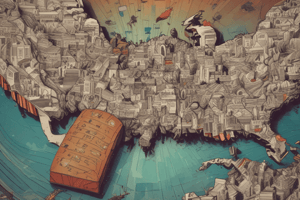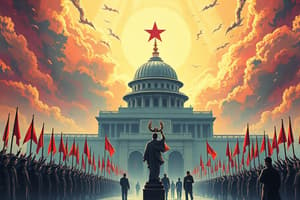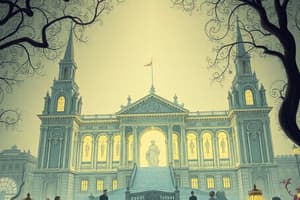Podcast
Questions and Answers
What fundamental aspect characterizes a totalitarian system?
What fundamental aspect characterizes a totalitarian system?
- Independent decision-making centers
- Absence of ideological commitments
- A rigid ideology guiding governance (correct)
- Complete freedom of expression
How does a totalitarian regime typically view the relationship between intellectuals and political authorities?
How does a totalitarian regime typically view the relationship between intellectuals and political authorities?
- Intellectual critique is encouraged to foster creativity.
- There is often tension due to ideological commitments. (correct)
- Intellectuals are always fully aligned with authorities.
- Intellectuals are excluded from political discussions.
What is one positive aspect of ideology in totalitarian systems?
What is one positive aspect of ideology in totalitarian systems?
- Reduction of state control in education
- Valuing education as a critical activity (correct)
- Promotion of individualism over collectivism
- Encouragement of diverse cultural expressions
What aspect of totalitarian systems contrasts them with traditional autocracies?
What aspect of totalitarian systems contrasts them with traditional autocracies?
Which of the following best describes the role of propaganda in totalitarian regimes?
Which of the following best describes the role of propaganda in totalitarian regimes?
What is often seen as a latent threat in totalitarian systems?
What is often seen as a latent threat in totalitarian systems?
How does totalitarian ideology affect the relationship between church and state?
How does totalitarian ideology affect the relationship between church and state?
In totalitarian regimes, what is typically true about the role of intellectuals?
In totalitarian regimes, what is typically true about the role of intellectuals?
What primarily limits the autonomy of organizations like industrial enterprises and professional groups in a totalitarian system?
What primarily limits the autonomy of organizations like industrial enterprises and professional groups in a totalitarian system?
What distinguishes totalitarian systems from other nondemocratic systems?
What distinguishes totalitarian systems from other nondemocratic systems?
According to the content, what is more important than the size of society or technological modernization in totalitarian systems?
According to the content, what is more important than the size of society or technological modernization in totalitarian systems?
What role does the single party play in totalitarian systems according to the analysis?
What role does the single party play in totalitarian systems according to the analysis?
How do totalitarian systems mobilize people for large-scale tasks according to the content?
How do totalitarian systems mobilize people for large-scale tasks according to the content?
The desire for monopolistic control in totalitarian regimes is primarily driven by what factor?
The desire for monopolistic control in totalitarian regimes is primarily driven by what factor?
What does the content suggest about the character of totalitarian systems?
What does the content suggest about the character of totalitarian systems?
What is a common characteristic of organizations linked to a single party in totalitarian systems?
What is a common characteristic of organizations linked to a single party in totalitarian systems?
What characterizes the center of power in a totalitarian system?
What characterizes the center of power in a totalitarian system?
How does the ideology in a totalitarian state function?
How does the ideology in a totalitarian state function?
What differentiates citizen participation in a totalitarian system from that in a democracy?
What differentiates citizen participation in a totalitarian system from that in a democracy?
What aspect of citizen behavior is considered undesirable by the rulers in a totalitarian society?
What aspect of citizen behavior is considered undesirable by the rulers in a totalitarian society?
What might make observers mistakenly perceive a totalitarian regime as a democracy?
What might make observers mistakenly perceive a totalitarian regime as a democracy?
Which of the following statements best describes the ideology in a totalitarian system?
Which of the following statements best describes the ideology in a totalitarian system?
What role does the ruling group or leader play in a totalitarian system concerning ideology?
What role does the ruling group or leader play in a totalitarian system concerning ideology?
In a totalitarian context, what is the nature of political participation?
In a totalitarian context, what is the nature of political participation?
Flashcards
Monistic Center of Power
Monistic Center of Power
A political system where power is concentrated in a single, dominating entity, which dictates the legitimacy of all other institutions and groups within society.
Exclusive and Elaborate Ideology
Exclusive and Elaborate Ideology
A comprehensive and rigid set of beliefs that guides the ruling group's actions and legitimizes its decisions. This ideology is enforced with sanctions against dissenting views.
Mandatory Participation and Mobilization
Mandatory Participation and Mobilization
Active involvement and mobilization of citizens through a single party and controlled organizations, aiming to encourage participation in political and social tasks.
Mobilizational Participation
Mobilizational Participation
Signup and view all the flashcards
Single Channel of Participation
Single Channel of Participation
Signup and view all the flashcards
Enforcement of Monolithic Ideology
Enforcement of Monolithic Ideology
Signup and view all the flashcards
Totalitarian Participation as a Facade
Totalitarian Participation as a Facade
Signup and view all the flashcards
Controlled Participation vs. Democratic Participation
Controlled Participation vs. Democratic Participation
Signup and view all the flashcards
Totalitarian System
Totalitarian System
Signup and view all the flashcards
Controlled Participation
Controlled Participation
Signup and view all the flashcards
Propaganda and Mass Education
Propaganda and Mass Education
Signup and view all the flashcards
Suppression of Dissent
Suppression of Dissent
Signup and view all the flashcards
Tension Between Intellectuals and Authorities
Tension Between Intellectuals and Authorities
Signup and view all the flashcards
Collective Goals vs. Individual Rights
Collective Goals vs. Individual Rights
Signup and view all the flashcards
Fear of Private Thought
Fear of Private Thought
Signup and view all the flashcards
Religion vs. Politics
Religion vs. Politics
Signup and view all the flashcards
Power Concentration in Totalitarianism
Power Concentration in Totalitarianism
Signup and view all the flashcards
Terror in Totalitarianism
Terror in Totalitarianism
Signup and view all the flashcards
The Single Party in Totalitarianism
The Single Party in Totalitarianism
Signup and view all the flashcards
Mobilization in Totalitarianism
Mobilization in Totalitarianism
Signup and view all the flashcards
Pseudo-Democracy in Totalitarianism
Pseudo-Democracy in Totalitarianism
Signup and view all the flashcards
Role of the Party in Development
Role of the Party in Development
Signup and view all the flashcards
Coercion in Totalitarianism
Coercion in Totalitarianism
Signup and view all the flashcards
Ideology in Totalitarianism
Ideology in Totalitarianism
Signup and view all the flashcards
Study Notes
Totalitarian Systems Characteristics
-
A totalitarian system has a single, central power. Pluralism exists, but is controlled and legitimized by this central power. Political institutions and groups derive their legitimacy from this center.
-
An elaborate, exclusive, and autonomous ideology guides the ruling group and the party. This ideology establishes boundaries for legitimate political action and provides a framework for social meaning and historical purpose. It transcends specific policy goals.
-
Citizen participation is actively mobilized and channeled through a single party and related groups. Passive obedience and apathy are discouraged. The participation is directed toward a single purpose controlled by the center.
-
The difference between participation in a totalitarian regime and a democracy fundamentally lies in the channel for participation. In a democracy, there are multiple, independent channels for citizen participation. In a totalitarian system, there is only one channel determined by the ruling group. The center controls the overall goals and direction of organizations. The constant feedback between the ruling group, ideology, and actions/participation characterizes a totalitarian system.
Intellectuals and Artists
- The relationship between intellectuals and artists and political authorities is often tense. This tension stems from ideological emphasis, fear of dissent from established ideologies, and the prioritization of collective versus individual goals.
Church and State
- Conflicts between religion and politics are exacerbated in totalitarian systems.
Propaganda
- Propaganda, education, cadre training, and intellectual elaboration of ideology are prominent features. These activities support the system and attract intellectual support, unlike in other non-democratic states.
Democratic Systems Compared
- Totalitarian systems are distinguished from other non-democratic systems by the way mass participation in political life is organized. A totalitarian system uses a single channel for participation and a unified purpose. Non-democratic systems might use multiple channels, or no channels at all.
Studying That Suits You
Use AI to generate personalized quizzes and flashcards to suit your learning preferences.




